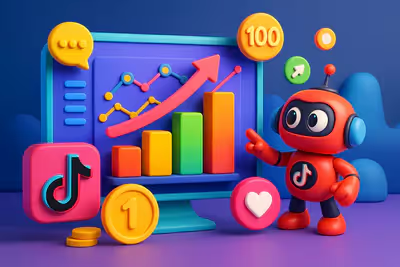Global Market Statistics

Artificial intelligence (AI) is a fast-growing field that promises to transform many aspects of our daily lives. In this text, we'll look at three key statistics that illustrate the potential impact of AI on the global economy.
- AI will add $16 trillion to the global economy by 2030: According to the World Economic Forum, AI will contribute significantly to the growth of the global economy, adding nearly $16 trillion by 2030.
- AI will be one of the most important growth sectors over the next few years: According to Fortune Business Insights, the AI market is expected to increase significantly over the next few years, with an average annual growth rate of 33.2% between 2020 and 2027. Investors who start early in this sector could therefore benefit from rapid growth and high returns.
- North America will hold the largest share of the AI market: Several factors contribute to North America's dominance in the AI market, including public funding and AI-focused research conducted at universities, as well as the strong presence of technology companies. According to Fortune Business Insights, North America is expected to continue to dominate this market over the next few years.
These statistics show that AI is a growing field that promises to transform many aspects of our daily lives.
Businesses and investors who are ready to invest in AI could benefit from rapid growth and high returns, while economies around the world could also benefit from the impact of AI on economic growth.
Voice assistant statistics
Voice assistance and voice search are booming thanks to advances in Artificial Intelligence. Users of smartphones, connected devices, and work tools are increasingly using voice to interact with digital systems.
1. Use of voice AI on the rise
- According to a Pew Research Center study, 55% of participants use AI while on the go and cannot use their hands to interact with their smartphone.
2. Use in work and daily life
- Voice search and voice assistance are becoming increasingly popular as smart homes, virtual reality, and augmented reality become more common in our daily lives.
- Users connect to other systems remotely using their voice, allowing the systems to “play” together and reduce bottlenecks or slowdowns in multiple processes.
3. Network security
- AI will help strengthen network security by improving threat detection and mitigation, which will increase the overall level of security.
- With more secure systems and networks, businesses will have more confidence in these devices and therefore use their AI voice assistants even more. (Statista)

Productivity in the use of AI
AI is a topic that is increasingly present in our daily lives, whether at home, at work or in living environments. In this article, we will explore different aspects of the impact of AI on business productivity.
1. Business productivity
- According to PwC, 52% of executives surveyed believe that their company has seen productivity increase thanks to AI tools.
- AI makes it possible to improve various aspects of business, such as personal assistants, chatbots, and billing systems, which can streamline business operations.
2. Integration into business processes
- 25% of managers believe that their business processes have been fully activated thanks to AI, according to PwC.
- Integrating AI into business processes allows businesses to strengthen themselves in a competitive market and provide better products or services to their customers.
3. Facilitating decision making
- More than half of the participants in the PwC survey said that AI was crucial in helping to quickly draw conclusions and adapt to circumstances that could affect their particular sector.
- AI can help with decision-making by taking into account aspects that humans would not have thought of and by proposing consequences that would not otherwise have been anticipated.
AI statistics in sales
This text discusses the impact of artificial intelligence (AI) on corporate EBIT, sales, and customer service.
- AI has a significant impact on business EBIT. According to a study by McKinsey & Company, AI is involved in a minimum of 20% of EBIT and will have a positive impact on EBIT in the short and long term through increased productivity and speed.
- Business sales are positively affected by AI. Nearly 8 out of 10 sales departments were found to be positively affected by AI, which can help business owners optimize internal business operations, target the right audience more effectively, and gain an advantage over competitors.
- AI can help improve customer segmentation and provide better customer service. The McKinsey & Company study suggests that most businesses that use AI can reap these benefits.

Marketing AI statistics
Artificial intelligence (AI) has become an essential technology for businesses looking to improve productivity and provide a quality customer experience.
Marketing is one of the areas that can benefit from AI, along with increased performance and the ability to reach new customers.
- More than half of the participants surveyed saw increased performance thanks to AI in marketing. Adobe
- Large businesses are in the process of adopting AI in their marketing departments, with 29% of respondents saying that AI is crucial in this regard. Adobe
- Small and medium-sized businesses don't seem to prioritize AI as much as others in marketing, with only 12% of SME participants saying they use AI to drive their campaigns and experiences. Adobe
Why is AI becoming crucial?
Automation plays an important role in our daily lives and AI technologies are increasingly being used to provide solutions that simplify actions without human intervention.
Over the years, deep learning capabilities have been developed to replicate the way humans think. Let's take a closer look at the important data.
- AI algorithms provide solutions for automating processes, maximizing customer satisfaction, and reducing operational costs.
- AI technologies have seen significant improvements over the past decade thanks to deep learning capabilities.
- Deep learning is a form of machine learning that involves multiple layers between input and output nodes to model problems in a hierarchical manner.
- Advances in deep learning allow software agents to perform complex tasks in a manner similar to that of humans.
AI technologies, especially deep learning, have revolutionized the way software agents perform complex tasks.
As automation continues to become an integral part of our daily lives, advances in AI will continue to transform the way we work and interact with the world.
Professional life and AI

In businesses, there are various aspects that can benefit from AI technologies. These include some of the following aspects.
1. Optimization of products and services.
Through data analysis and predictive analytics, customer data platforms can discover models that lead to better products and services by recommending appropriate customer solutions.
It is now possible to analyze customer feedback in real time and generate product improvements faster than ever.
2. More effective marketing strategies.
Algorithms allow marketers to create more accurate targeting by exploiting psychographic profiles based on social media information.
They can identify trends quickly, allowing them to launch new campaigns with minimal risk.
3. Customer experience management.
Thanks to live chatbots and natural language processing (NLP), software and companies of call centers can improve their interactions with end users through automated processes.
An AI strategy allows businesses to analyze customer behavior to identify what could improve the customer experience.
Customer service interactions, which were previously only manual, now benefit from the power of AI integration, achieving a much higher level of customer satisfaction.
For example, chatbots can answer many frequently asked questions about a company's products and services, reducing the length of conversations needed between customers and agents.
4. Increase revenue through effective process management.
Algorithms can collect data from different parts of a business environment, analyze it, and identify improvement opportunities to increase operational efficiency.
This is especially useful when it comes to finding hidden issues that could affect sales or other areas of the organization.
These areas can then be corrected before they become critical.
5. Improve business performance management and decision making.
Algorithms can use data from different business departments, such as sales, marketing, finance, and human resources, to provide an integrated picture of the overall health of the business.
This allows suppliers to make decisions more quickly, which is crucial in a volatile market environment where changes can have a significant impact on critical parameters.
6. Helping sales and marketing reach their potential
A well-defined AI strategy is one where the sales and marketing strategy is aligned with business goals.
Such a strategy is used to gain an advantage over competitors by increasing market share, especially in highly competitive sectors.
7. Increase revenue by improving lead management
Lead evaluation has become a key measure of sales effectiveness.
Machine learning algorithms can assign accurate scores based on detailed analysis of behavioral factors, engagement levels, demographics, and other factors, making them more reliable than manual scores.
Algorithms can improve marketers' ability to prioritize leads, which reduces the overall cost of marketing because less effort is wasted on customers who aren't likely to buy.
8. Importance of data protection
While AI and machine learning help businesses immensely, it's important to remember that customer data is sacred.
Any company that uses data to make decisions must do so ethically and responsibly, ensuring the transparency of its practices.
Personal life and AI
You can't talk about the AI industry without considering the impact that AI assistants like Amazon's Alexa and Google Assistant have had on our daily lives.
These technologies allow us to control devices with our voice, creating a more natural interaction between us and the devices we use frequently.
Various platforms like Netflix, Apple's Siri, and Google Assistant all use AI to provide recommendations, while Pandora and Spotify use it to stream personalized music.
These platforms have made everyday tasks easier and more enjoyable, without people having to spend a lot of time learning to use this new technology.
Summary.
The interesting statistics on AI show you how artificial intelligence gives business leaders a competitive advantage that can guide their organizations to a higher level of customer satisfaction.
It also helps them comply with various government requirements related to AI and provides customers with great comfort in carrying out their daily tasks.
Data scientists are currently witnessing a digital transformation of artificial intelligence marketing, as the number of AI use cases is on the rise.
The number of AI-related jobs is also expected to become massive in the coming years, which is constantly increasing the size and profitability of the artificial intelligence market.
What do you think of AI? Have you integrated it into your business? Let me know your thoughts in the comments below.
Further reading: Now that you know where the artificial intelligence market is heading, check out this list of best machine learning software to see if any of them are right for you and your business.
In addition, if you want to know how AI is currently affecting the writing sector, here is my post on best AI writing software to see what the future holds for writers.

.svg)





